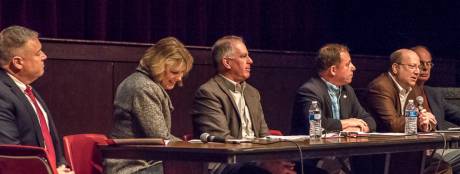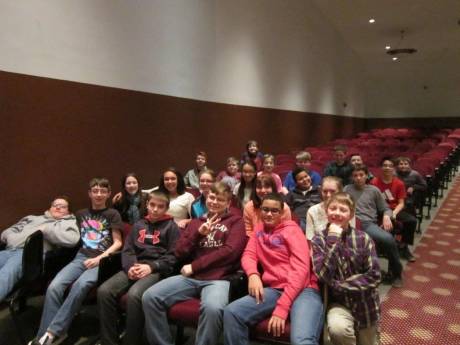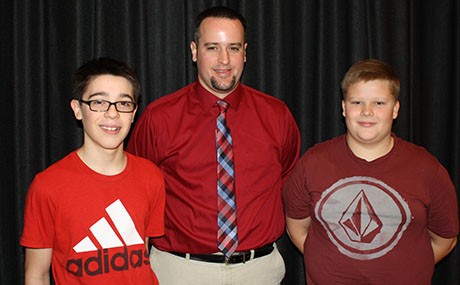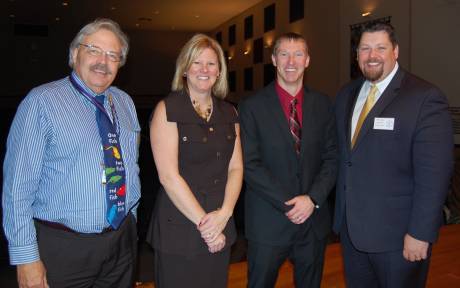A panel of legislators and an audience of school board members and administrators who gathered in Pavilion on Saturday morning all seemed to agree that cuts in state aid to schools, mandates, and a restrictive property tax cap are hurting school districts.
School districts are in financial dire straights and can't continue to tap into reserves to provide the same level of services to students and their families was the general message of the discussion.
"What we would like to see, because we know the property tax cap is so low, what we would like to see in the Senate Republican Caucus, is eliminate the GA (Gap Elimination Adjustment) fully this year and add to the Foundation Aid so that we can fund our schools," said Sen. Cathy Young, who represents Cattaraugus County and is chair of the State Senate's Finance Committee.
Gap Elimination Adjustments were a prime target during the panel discussion. The program is a product of 2010-11 fiscal year when state funds were tight and Foundation Aid was being cut. While the word "gap" might imply the program was meant to replace what was being lost in Foundation Aid, for most school districts in the state, the program just meant fewer dollars to fund programs.
For the region, GA has cost school districts more than $140 million over the past five years. For the current fiscal year, those school districts are underfunded, officials say, by $21,447,597.
Meanwhile, the complicated tax cap formula limits any increase in school district revenue to .12 percent.
David Little, executive director of NYS Rural Schools, said there are districts that a year ago didn't need a voter-approved tax cap override, but this year, with the exact same budget, will need to go to voters for approval.
Until 2010-11, school districts were kept on a level playing field across the state through Foundation Aid. It's a complex formula but accounts for publication, household income, district size and cost of living to arrive at the size of an annual grant to school districts to ensure they have enough operational revenue.
Over the past five years, as the figures above indicate, Foundation Aid has been slashed drastically, and GA hasn't closed the gap.
The issue of mandate relief was raised early in the discussion by Paul Alioto, superintendent in Dansville, and several of the panel members responded.
Sen. Michael Ranzenhofer said he was on a task force that came up with a list of 51 mandates that could be targeted for elimination, but as soon as you start to dig into them one-by-one, you find each has their constituency, people who will fight tooth and nail to keep it alive.
One of his pet mandates to eliminate is one that requires a third audit of district financial records. It costs districts from $10,000 to $100,000 annually and in Ranzenhofer's view, it's unnecessary. He was able to get a bill through that exempted the state's smallest school districts, but subsequent attempts to exempt more districts have been stymied.
"We have to be able to get (a reform) through both houses," Ranzenhofer said. "It seems like common sense to me, but there is somebody in the Assembly majority who feels it is a good idea to have these audits."
Young said mandates around special needs students are particularly contentious. Many of the mandates could be shifted to a federal budget responsibility, but at the local level, people fear change. At the local level, it's often easy to see how mandated spending on even one special needs child might lead to the elimination of an advanced placement class, which creates local conflicts, but it's difficult to shift expense responsibility to the federal government.
David Little said New York's funding formula is backward compared to just about every other state in the Union. In New York, the state picks up only about 40 percent of the cost of education; in other states, the school district is on the hook for less than 40 percent and the state covers the rest of the expense.
And that's something that could be fixed easily, Little said, at least in theory, though the politics of it are much more tricky. The state mandates a pension program that is state run, but the school districts pay into the program. If the state covered pension expense, Little said, that 40/60 split would flip. It would lift a huge expense burden from school districts.
Assemblyman Bill Nojay took aim at standardized testing. He said children need a broad range of experience and the ability to think critically. The system, he said, is forcing children at a younger and younger age into silos -- "you're going to be a doctor, you're going to be an engineer ... "
He said he was in China recently and their standardized testing is even more rigorous, and people there complain about it.
"For what purpose?" Nojay said. "No matter how good the standards, we are teaching to the test, for lack of a better term, and the obsession with testing, in my judgment, and the Chinese experience, it's not good for child development. It is immensely counterproductive to the development of a society."
Assemblyman Steve Hawley said the drift in education is being driven by a progressive agenda that is hurting America in a lot of ways, and he spoke at length about increases in the minimum wage and problems with the healthcare system.
He shared a story about a call from a restaurant owner who employs 27 servers. An increase in the minimum wage to $15 an hour will cost that restaurant owner an additional $105,000 a year.
The owner also recently had a waitress and cook who fell in love and she became pregnant. The waitress did have health insurance, so the owner set her up with an appointment with a health insurance navigator. he waitress reported back that the good news was, she was going to get health insurance. The bad news was that in order to qualify, she couldn't work more than two days a week, and the child's father, a full-time cook at the restaurant, couldn't work more than three days a week.
"We've lost our way in this state with hands out instead of hands on, actually working," Hawley said. "This is not the America we grew up in. It's not the free enterprise system we all prospered under, or tried to prosper under, and that movement over the last seven years across this state is going the wrong way and it's hurting education."
































































